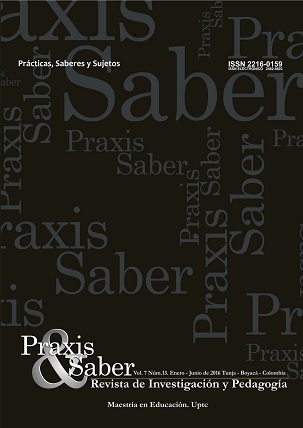Viotá: pedagogical possibilities of a reborn paradise

Abstract
Viotá has been a scene of ideological struggles and of an extended process of violence characteristic of the armed conflict in Colombia that has affected the internal dynamics of the municipality, particularly the relationships between its people and their sense of belonging. In this context the subproject ‘Identity and Cultural Heritage’ —assigned to the project ‘Design, implementation, management and projection of Research and Development (R &, D) of the pilot program for the creation of productive projects in Central and West Cundinamarca, epicenter Viotá: Potentiating the City-region’, by the Universidad Piloto de Colombia— proposed to generate, in 2014, teaching strategies from historical and cultural approaches in order to strengthen the collective identity, specifically articulated with two schools in the municipality. In this perspective, some methodological details are presented and the teaching strategy —formulated on the basis of the community’s needs— is explained.Keywords
education, pedagogy, history, identity, Viotá
References
- Acero-Duarte, L. E. (2007). Viotá, un paraíso en Los Andes colombianos: monografía histórica. Bogotá: L.E. Acero Duarte.
- ACERO, L. E. (2013/11/20). Entrevista por Marcela González Terreros, Diana Carolina Piraquive Monroy y Andrés Mauricio Chaves Remolina.
- ALCALDÍA DE VIOTÁ - CUNDINAMARCA (2012). Historia. Recuperado el 2 de diciembre de 2013 de http://viota-cundinamarca.gov.co/información general.shtml#historia
- Betancourt-Echeverry, D. (2006). Memoria individual, memoria colectiva y memoria histórica. Lo secreto y lo escondido en la narración y el recuerdo. La práctica investigativa en Ciencias Sociales. Bogotá: Universidad Pedagógica Nacional.
- CORREDOR, G. (2013/05/20). Entrevista por Diana Carolina Piraquive Monroy y Andrés Mauricio Chaves Remolina.
- CORREDOR, M. (2014/07/02). Entrevista por Diana Carolina Piraquive Monroy y Andrés Mauricio Chaves Remolina.
- DIRECCIÓN DE INVESTIGACIONES DE LA UNIVERSIDAD PILOTO DE COLOMBIA (2013). Ficha general de proyecto de investigación [documento institucional]. Bogotá: Universidad Piloto de Colombia.
- DIRECCIÓN DE INVESTIGACIONES DE LA UNIVERSIDAD PILOTO DE COLOMBIA (2014). Ficha general de proyecto de investigación [documento institucional]. Bogotá: Universidad Piloto de Colombia.
- GIMÉNEZ, G. (1997). 'Materiales para una teoría de las identidades sociales'. Frontera Norte [9 (18) 1-25]. Recuperado el 15 de noviembre de 2014 de http://docentes2.uacj.mx/museodigital/cursos_2008/maru/teoria_identidad_gimenez.pdf
- GIMÉNEZ, G. (2009). 'Cultura, identidad y memoria. Materiales para una sociología de los procesos culturales en las franjas fronterizas'. Frontera Norte [21(41) 7-32] Recuperado el 15 de noviembre de 2014 de http://www.scielo.org.mx/scielo.php?cript=sci_arttext&pid=S0187-73722009000100001
- Hering, M. & Pérez, A. (ed.) (2012). Historia Cultural desde Colombia. Categorías y debates. Colombia: Universidad Nacional de Colombia.
- MEJÍA-NAVARRETE, J. (2002). 'Perspectiva de la Investigación Social de Segundo Orden'. Cinta de Moebio [14, 200-225]. Recuperación el 23 de noviembre de 2013 de http://www.revistas.uchile.cl/index.php/CDM/article/viewFile/26230/27522
Downloads
Download data is not yet available.